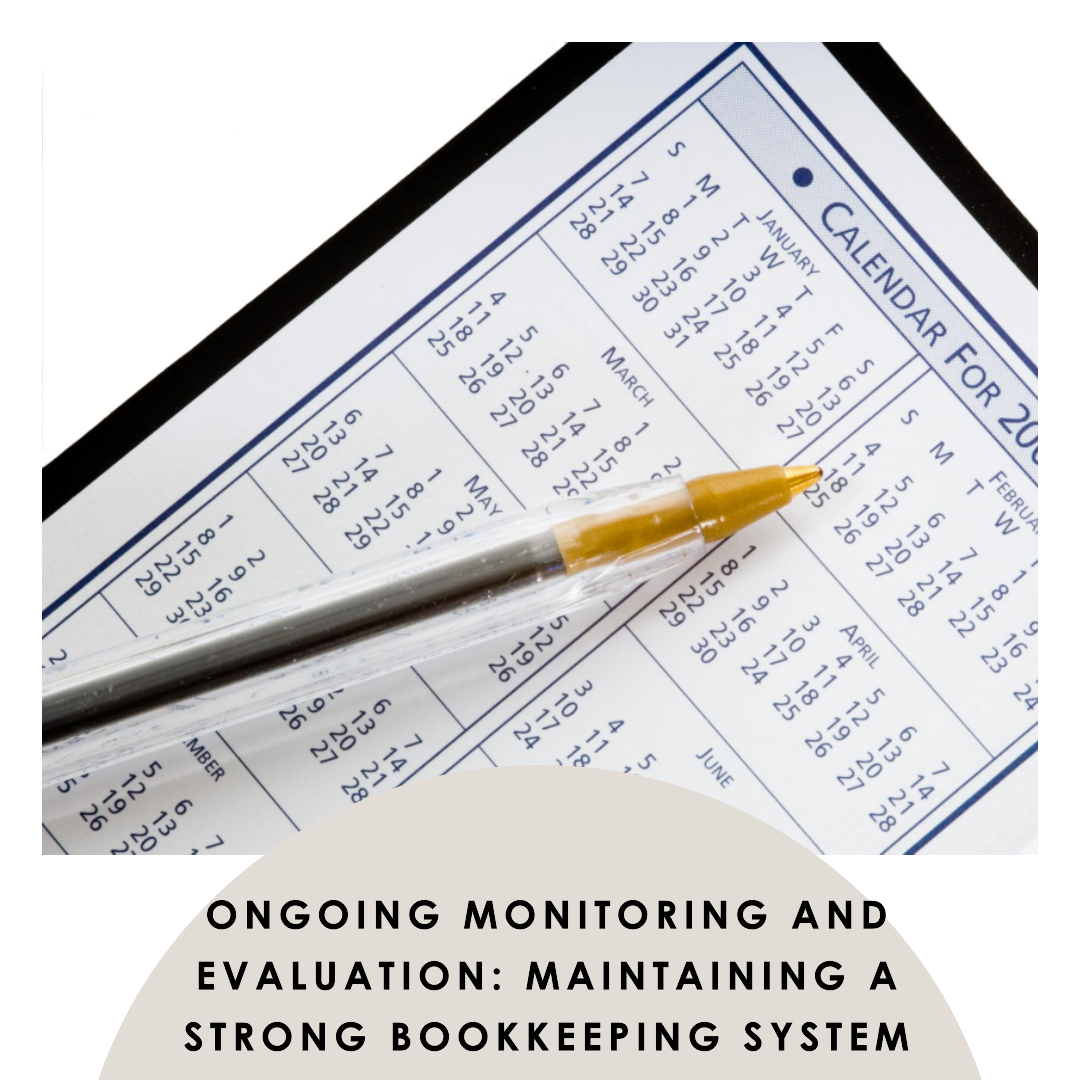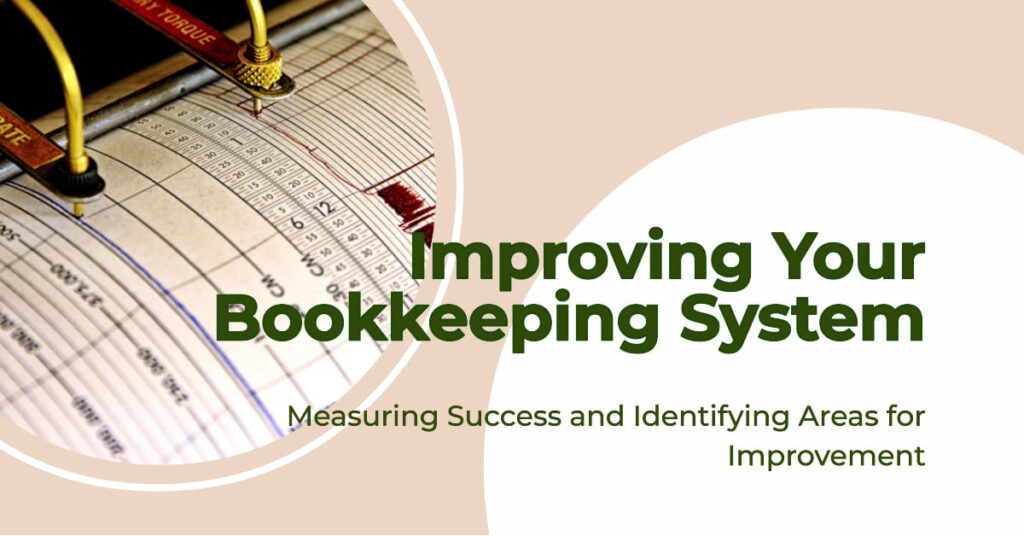Evaluating and improving your bookkeeping system is crucial to ensure the financial stability and success of your business. Measuring success through key performance indicators (KPIs) such as accounts receivable turnover and identifying areas for improvement, including automation, simplified chart of accounts, and clear processes and procedures can help maintain a strong system. Additionally, ongoing monitoring and evaluation through regular reviews, KPI tracking, audits, and staying up-to-date on regulations are essential. Implementing changes through a well-planned approach, clear communication, training, monitoring, and remaining flexible can lead to a successful bookkeeping system. With a strong bookkeeping system in place, you can make informed decisions and ensure the financial health of your business.

The Importance of Evaluating and Improving Your Bookkeeping System
Evaluating and improving your bookkeeping system is crucial for the financial success and stability of your business. A well-designed bookkeeping system provides accurate financial information, which is essential for making informed business decisions, tracking progress, and identifying areas for improvement. Evaluating and improving your bookkeeping system can help you:
- Ensure Accuracy: Accurate bookkeeping is crucial for making informed business decisions and complying with legal requirements. Evaluating your bookkeeping system can help you identify errors and areas for improvement to ensure the accuracy of your financial records.
- Save Time: A well-designed bookkeeping system can save you time and money by automating tasks and minimizing the need for manual data entry. By evaluating and improving your bookkeeping system, you can streamline processes and free up time for other important tasks.
- Make Informed Decisions: Accurate financial information is critical for making informed business decisions. Evaluating your bookkeeping system can help you identify trends, track performance, and make informed decisions about the future of your business.
- Identify Areas for Improvement: A thorough evaluation of your bookkeeping system can help you identify areas for improvement, such as outdated processes, inefficient workflows, or ineffective software. By improving your bookkeeping system, you can optimize your financial operations and increase your bottom line.
- Stay Compliant: Accurate bookkeeping is essential for complying with legal requirements, such as tax laws and financial regulations. Evaluating and improving your bookkeeping system can help you stay compliant and avoid costly fines or legal issues.
Measuring Success: Key Performance Indicators (KPIs) to Track
To measure the success of improving your bookkeeping system, you can track several key performance indicators (KPIs) that provide insights into the financial health and stability of your business. Here are some KPIs to consider:
- Revenue: Tracking your revenue over time can help you identify trends and make informed decisions about pricing and sales strategies.
- Expenses: Monitoring your expenses can help you identify areas where you can reduce costs and improve your bottom line.
- Cash Flow: Keeping track of your cash flow can help you identify potential cash shortages and take steps to avoid them.
- Accounts Receivable: Tracking your accounts receivable can help you identify potential cash flow issues and take steps to collect outstanding payments.
- Accounts Payable: Monitoring your accounts payable can help you stay on top of your bills and avoid late fees or missed payments.
- Profit Margins: Tracking your profit margins can help you identify areas where you can improve efficiency or reduce costs to increase your profits.
- Return on Investment (ROI): Measuring your ROI can help you evaluate the effectiveness of your investments and make informed decisions about future investments.
By tracking these KPIs, you can get a comprehensive view of the financial health and performance of your business and make informed decisions about how to improve your bookkeeping system

Identifying Areas for Improvement: Common Bookkeeping Challenges
Identifying areas for improving your bookkeeping system can be challenging, especially if you’re not familiar with common bookkeeping challenges. Here are some of the most common bookkeeping challenges that can impact the accuracy and efficiency of your financial records:
- Manual Data Entry: Entering data manually into your accounting software can be time-consuming and prone to errors. It’s important to consider using automation tools to streamline the process and reduce errors.
- Reconciling Bank Accounts: Bank reconciliation is a critical part of the bookkeeping process, but it can be challenging and time-consuming. Automated bank feeds can help make the process quicker and more accurate.
- Tracking Expenses: It can be difficult to track and categorize expenses, especially if you have multiple expense accounts. Implementing a system that tracks expenses in real time can help make this process easier.
- Inaccurate Record Keeping: Poor record-keeping practices can lead to inaccurate financial records, which can have significant impacts on your business. It’s important to establish clear processes for record-keeping to ensure accuracy.
- Compliance Issues: Tax laws and financial regulations can be complex and confusing. It’s important to stay up-to-date on these regulations and ensure compliance to avoid costly fines and legal issues.
- Poor Communication: Bookkeeping requires collaboration and communication between different stakeholders, such as bookkeepers, accountants, and business owners. Poor communication can lead to errors, redundancies, and missed opportunities for improvement.
By identifying these common bookkeeping challenges and taking steps to address them, you can improve the accuracy and efficiency of your bookkeeping system and ensure the financial health and stability of your business.

Strategies for Improving Your Bookkeeping System
Improving your bookkeeping system can be a complex and multi-faceted process, but there are several strategies you can use to optimize your financial operations. Here are some strategies to consider:
- Invest in Automation: Automation tools, such as automated bank feeds and f-tracking software, can save time and reduce errors by streamlining processes.
- Simplify Your Chart of Accounts: Simplifying your chart of accounts can help you track expenses more accurately and make it easier to generate financial reports.
- Use Cloud-Based Accounting Software: Cloud-based accounting software allows you to access your financial data from anywhere, and collaborate with your team in real-time.
- Establish Clear Processes and Procedures: Establishing clear processes and procedures for record-keeping, expense tracking, and other financial tasks can help ensure accuracy and consistency.
- Outsource Bookkeeping: Outsourcing your bookkeeping to a qualified professional can help ensure accuracy and compliance, and free up time for you to focus on other important business tasks.
- Stay Up-to-Date on Regulations: Keeping up-to-date on tax laws and financial regulations can help you avoid compliance issues and reduce the risk of legal problems.
By implementing these strategies for improving your bookkeeping system, you can improve the accuracy, efficiency, and effectiveness of your bookkeeping system, and help ensure the financial health and stability of your business.
Implementing Changes: Tips for Success
Implementing changes to improve your bookkeeping system can be a challenging process, but with the right approach, you can increase the likelihood of success. Here are some tips to consider:
- Start with a Plan: Before making any changes, develop a plan that outlines the steps you’ll take and the goals you want to achieve. This will help you stay focused and ensure everyone is on the same page.
- Communicate Clearly: Communication is key when implementing changes. Make sure you clearly communicate the changes to all stakeholders, including employees, bookkeepers, and accountants.
- Get Buy-In from Key Stakeholders: Getting buy-in from key stakeholders can help ensure that everyone is on board with the changes and willing to support them.
- Train Employees: Proper training is essential for the success of any new system or process. Make sure employees understand the changes and how to use any new tools or software.
- Monitor Progress: Keep track of progress to ensure that the changes are having the intended effect. This will help you identify areas that need further improvement and make adjustments as needed.
- Stay Flexible: Be prepared to make adjustments as needed based on feedback and results. The ability to adapt and make changes quickly can help ensure the success of your new system.
In context with improving your bookkeeping system, By following these tips, you can increase your chances of success when implementing changes to your bookkeeping system. Remember to be patient and persistent, and don’t be afraid to ask for help if you need it.

Ongoing Monitoring and Evaluation: Maintaining a Strong Bookkeeping System
Improving your bookkeeping system, Maintaining a strong bookkeeping system requires ongoing monitoring and evaluation to ensure accuracy, efficiency, and compliance. Here are some tips for ongoing monitoring and evaluation:
Schedule Regular Reviews: Schedule regular reviews of your financial records to identify any discrepancies, errors, or areas for improvement.
Monitor Key Performance Indicators (KPIs): Track KPIs such as accounts receivable turnover, cash flow, and profitability to identify trends and make informed decisions.
Stay Up-to-Date on Regulations: Stay up-to-date on tax laws and financial regulations to ensure compliance and avoid penalties.
Conduct Regular Audits: Conduct regular audits to ensure that your financial records are accurate and up-to-date.
Seek Feedback: Ask for feedback from employees, bookkeepers, and accountants to identify areas for improvement and ensure that everyone is on the same page.
Stay Organized: Maintain an organized filing system for financial records to make it easier to find and retrieve important documents.
In context with improving your bookkeeping system, By following these tips, you can maintain a strong bookkeeping system and ensure the financial health and stability of your business. Remember, effective bookkeeping requires ongoing attention and effort, but the benefits are worth it.



